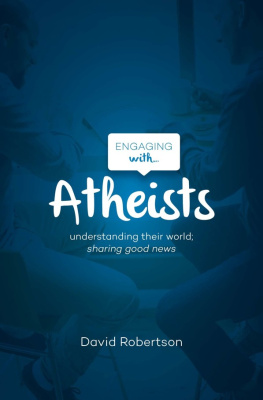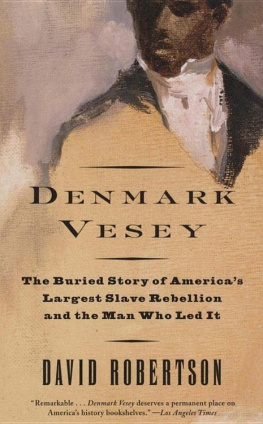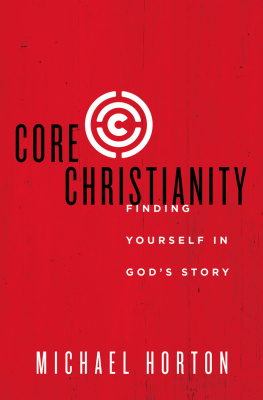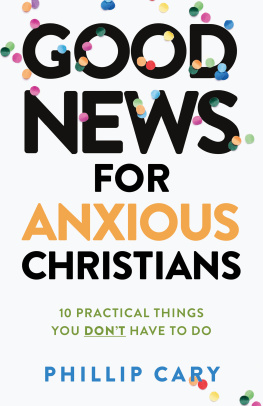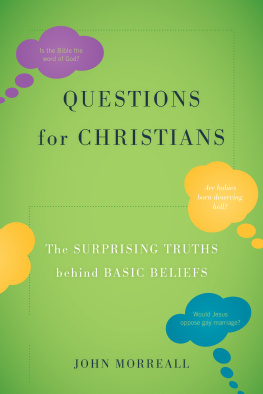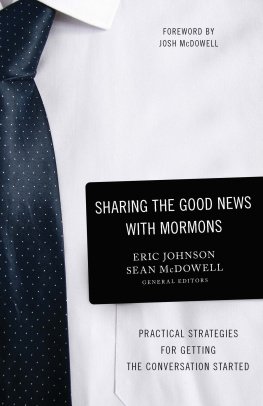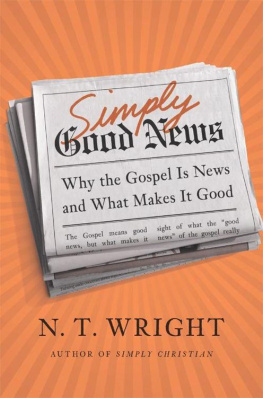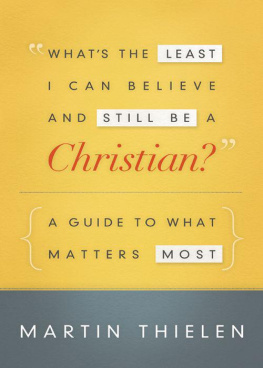Engaging with Atheists
hello
Understanding their world, sharing good news
David Robertson
David Robertson/The Good Book Company, 2014.
Published by
The Good Book Company
Tel (UK): 0333 123 0880
International: +44 (0) 208 942 0880
Email: info@thegoodbook.co.uk
Websites:
UK: www.thegoodbook.co.uk
North America: www.thegoodbook.com
Australia: www.thegoodbook.com.au
New Zealand: www.thegoodbook.co.nz
The Holy Bible, New International Version, NIV Copyright 1973, 1978, 1984, 2011 by Biblica, Inc. Used by permission. All rights reserved worldwide.
ISBN (ebook): 9781909919136
ISBN (print): 9781909919099
All rights reserved. Except as may be permitted by the Copyright Act, no part of this publication may be reproduced in any form or by any means without prior permission from the publisher.
Design by Andr Parker
Preface
Christians have a wonderful message to tell the world. As the angel said at the birth of Jesus, it is good news of great joy, for all people (Luke 2 v 10). But sometimes we have been slow to take that message of forgiveness and new life to others.
Sometimes its because we have become distracted . There are so many things that can push the need to tell others from its central place in our calling as individuals and churches. We get wrapped up in our own church issues, problems and politics. Or we get sidetracked by the very real needs of our broken and hurting world, and expend our energies dealing with the symptoms rather than the cause.
Sometimes its because we have lacked conviction. We look at people who seem relatively happy or settled in their own beliefs, and just dont think Jesus is for them. Or perhaps we have just forgotten just how good the good news is, and how serious the consequences for those who enter eternity unforgiven.
But sometimes it has been fear that has held us back from sharing the good news about Jesus. When we meet people whose culture, background or beliefs are so different from ours, we can draw back from speaking about our own faith because we are afraid of saying the wrong thing, unintentionally offending them, or getting into an unhelpful argument that leads nowhere.
This little series of books is designed to help with this last issue. We want to encourage Christian believers and whole churches to focus on our primary task of sharing the good news with the whole world. Each title aims to equip you with the understanding you need, so that you can build meaningful friendships with others from different backgrounds, and share the good news in a relevant and clear way.
It is our prayer that this book will help you do that with a neighbour, friend or work colleague who has no belief in God, or who has abandoned belief in God entirely. We pray that the result would be great joy as they understand that Jesus is good news for them.
Tim Thornborough
Series Editor
Introduction
This is a book about engaging with atheists. What does that mean? Perhaps it is easier to say what it does not mean.
This is not a war cry, showing how we can combat and argue with the new and aggressive group that I call the New Fundamentalist Atheists. Anyone who has engaged online, or face to face with them will know how pointless and usually fruitless that is.
Nor is it really for those of you who regularly meet with philosophy professors who are well-read, intellectual atheists in order to discuss the philosophical proofs for God, involving long strange words.
Nor is the purpose of this short book to provide you with a series of knock-out arguments that will enable you to walk off the debating battlefield victorious. Neither is it a how to manual which will result in all your friends, family and colleagues becoming Christians.
This is simply a book that hopes to encourage and equip you to engage in a winning and winsome way, with the increasing number of ordinary people you know and meet in modern Western culture who are influenced by a worldview that either does not believe in God atheist or which believes that, if he does exist, it is impossible to know anything about God agnostic .
I am not an expert. I am a middle-aged minister in a church in a small Scottish city. I have been engaged in ministry for 27 years in both the country and in the city. As a working pastor in ordinary local churches, I see the crying need for evangelism. We need more Christians. Church growth, church planting, church renewal and church reformation all require, as well as produce, new believers.
But how do people become believers? Through hearing the word of God. But how can people hear if they dont come to church, read Christian books or listen to Christian media? We need to go to them. In the past, our strategy for outreach has centred on big rallies, tent meetings, open-air preaching and door-to-door visitingall of which still have their place. But the bottom line is that the gospel is best gossiped by believers who have a passion and commitment to telling the good news to those in desperate need of it, and who belong to a local church where the Bible is central to its ministry and life.
I have been seeking to encourage this kind of evangelism for a number of years, and have practised it myself. I am encouraged by the fruits of this work. Breaking up the ground and sowing the seed requires patience, love and hard work, but it does eventually result in reaping the harvest.
After writing The Dawkins Letters a book that replies very specifically to the arguments laid out in Richard Dawkins book The God Delusion many doors opened to me. I could not walk through them all and so we set up the Solas Centre for Public Christianity, which engages with, and trains people to engage with, the atheistic/agnostic secular people of our day. We are absolutely convinced that church-based persuasive evangelism is the need of the hour and that it is possible. This small book will, I hope, help equip you to engage in those who believe there is no God.
We begin by looking at who the atheists are; in chapter two we look at beliefs and practices of atheists; chapter three looks at how we engage personally; chapter four is the longest and looks at how we apply the gospel to the beliefs and practices described in chapter two; chapter five offers some guidance on using the Bible in engaging with atheists; chapter six makes some suggestions as to how the local church can engage; and chapter seven offers some concluding thoughts.
I was speaking at a conference a couple of years ago and a man came up to thank me. He was very kind; You and Tim Keller are my favourite speakers, he said. When I hear him, I thank the Lord that he is on our side. He is so brilliant. When I hear you, I think I could do that!.
I took it as a great complement. I hope that after you have read this book, you will be able to say I could do that, and that the Lord would take our weak and feeble efforts to serve him and use them for his glory in bringing many people to himself.
Understanding Atheists
Chapter One
Who are the atheists?
1. Who are the atheists?
The visitor from Jackson, Tennessee, was beside himself: Im so excited, I met me a real life a-thee-ist. I aint never met a real life atheist before. The note of delight and surprise was evident as two cultures clashedthe religious southern USA and godless Scotland.
It was pointed out to our visitor that 14% of the USsome 50 million peoplenow self-identify as atheists and that that number is increasing. Nonetheless, any budding US President would commit political suicide if they announced that they were an atheist.
Even in the United Kingdom, where politicians famously dont do God, most atheists in the public arena are not proclaiming their atheism from the rooftops.

